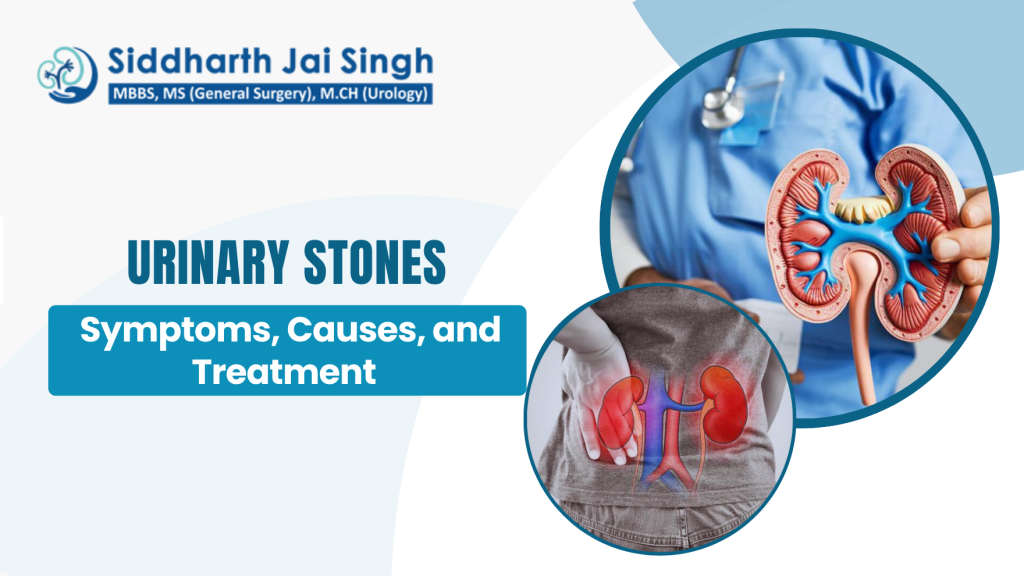Kidney stones, also known as urinary stones, are small, hard deposits that form inside the kidneys from minerals and salts in the urine. The function of the kidneys is to filter waste from the body, and when the balance of these minerals is off, stones can form. These stones can block the flow of urine, causing pain and infections. The condition can affect the kidneys, ureters (the tubes carrying urine to the bladder), bladder, and urethra.
What Are Kidney Stones?
Kidney stones (also called renal calculi) are formed when minerals in the urine crystallize and clump together. The stones can vary in size, from tiny crystals to larger stones. They can cause blockages and pain if they get stuck in the urinary tract. Stones are more common in people who don’t drink enough water, eat a diet high in certain salts, or have a family history of kidney stones.
Types of Kidney Stones:
- Calcium Stones: These are the most common type, made from calcium oxalate. Foods like spinach, nuts, and chocolate can increase oxalate in your urine.
- Uric Acid Stones: Common in people who eat a high-purine diet (red meat, seafood) or have acidic urine. People with gout are also at risk.
- Struvite Stones: These stones form due to infections in the urinary tract. They grow quickly and can get large.
- Cysteine Stones: A rare type caused by a genetic disorder where too much cystine leaks into the urine, forming stones.
Symptoms of Urinary Stones:
- Severe pain in the back or side, which can spread to the lower abdomen or groin
- Pain during urination
- Blood in urine (pink, red, or brown color)
- Nausea or vomiting
- Fever or chills if there’s an infection
- Frequent urge to urinate
Causes and Risk Factors Of Urinary Stones:
Kidney stones form when urine becomes too concentrated, causing minerals to stick together. Some of the main causes are:
- Dehydration: Not drinking enough water makes the urine more concentrated.
- Diet: A diet high in salt, protein, and oxalate-rich foods can lead to stones.
- Family history: If your family has had kidney stones, you’re more likely to get them too.
- Obesity: Overweight people have a higher risk of developing stones.
Prevention Tips Of Urinary Stones:
- Drink plenty of water: Stay hydrated to dilute the minerals in urine.
- Limit salt and protein: Reduce intake of salty and high-protein foods.
- Eat calcium-rich foods carefully: Low calcium can also cause stones, but avoid excessive calcium supplements.
Diagnosis and Treatment Of Urinary Stones:
If you have symptoms of kidney stones, Dr. Siddharth Jai Singh will likely suggest several tests like ultrasound, X-ray, or CT scans to confirm the presence of stones.
Treatment Options:
- Small Stones (Non-Surgical Management):
- Drink 2-3 liters of water daily to flush out small stones.
- Pain relief medications.
- Medical Therapy: Medicines like alpha-blockers (e.g., tamsulosin) can help pass stones more easily by relaxing the muscles in the ureter.
- Large Stones (Surgical Management):
- Extracorporeal Shock Wave Lithotripsy (ESWL): Uses sound waves to break stones into small pieces so they can pass in the urine.
- Ureteroscopy: A thin telescope goes through the urethra to remove or break the stone into smaller pieces.
- Percutaneous Nephrolithotomy (PCNL): A small incision is made in the back to remove larger stones directly from the kidney.
Who’s Likely to Get Urinary Stones?
Bladder stones can develop in anyone, but certain factors increase the likelihood. People who are at a higher risk include:
- Men over 50: Bladder stones are more common in men, especially older men, due to prostate enlargement, which can cause urinary obstruction.
- People with bladder obstructions: Conditions like an enlarged prostate, bladder diverticula, or urinary tract infections that obstruct the bladder’s flow can increase the risk.
- Those with neurogenic bladder: Nerve damage from conditions like spinal cord injuries, stroke, or diabetes can affect bladder function, leading to stone formation.
- People with kidney stones: Those who have kidney stones are also at risk of bladder stones, as the stones may move into the bladder and grow.
- Dehydration: Lack of water intake can cause concentrated urine, leading to the formation of stones in the bladder.
Dr. Siddharth Jai Singh’s Expertise:
Dr. Siddharth Jai Singh, a renowned kidney specialist in Siliguri and Bhagalpur, offers comprehensive treatment for kidney stones and other urological conditions. With his advanced training and years of experience, he specializes in both non-invasive and surgical treatments to remove stones effectively.

Dr. Siddharth Jai Singh
Consultant Uro-surgeon in Siliguri
MBBBS, MS (General Surgery), MCh (Urology)
Consultant Urologist, Andrologist, Laparoscopic and Renal Transplant Surgeon
Call For Appointment +91 97094 44999
Why Choose Dr. Siddharth Jai Singh?
- Highly Experienced: Dr. Siddharth Jai Singh has many years of experience treating kidney stones and other urological conditions.
- Advanced Technology: He uses the latest technology for diagnosis and treatment, including minimally invasive procedures.
- Personalized Care: Dr. Singh ensures that every patient receives a treatment plan tailored to their specific needs.
If you’re experiencing symptoms of kidney stones or need expert urological care, Dr. Siddharth Jai Singh is here to help with the best treatments for your condition.

